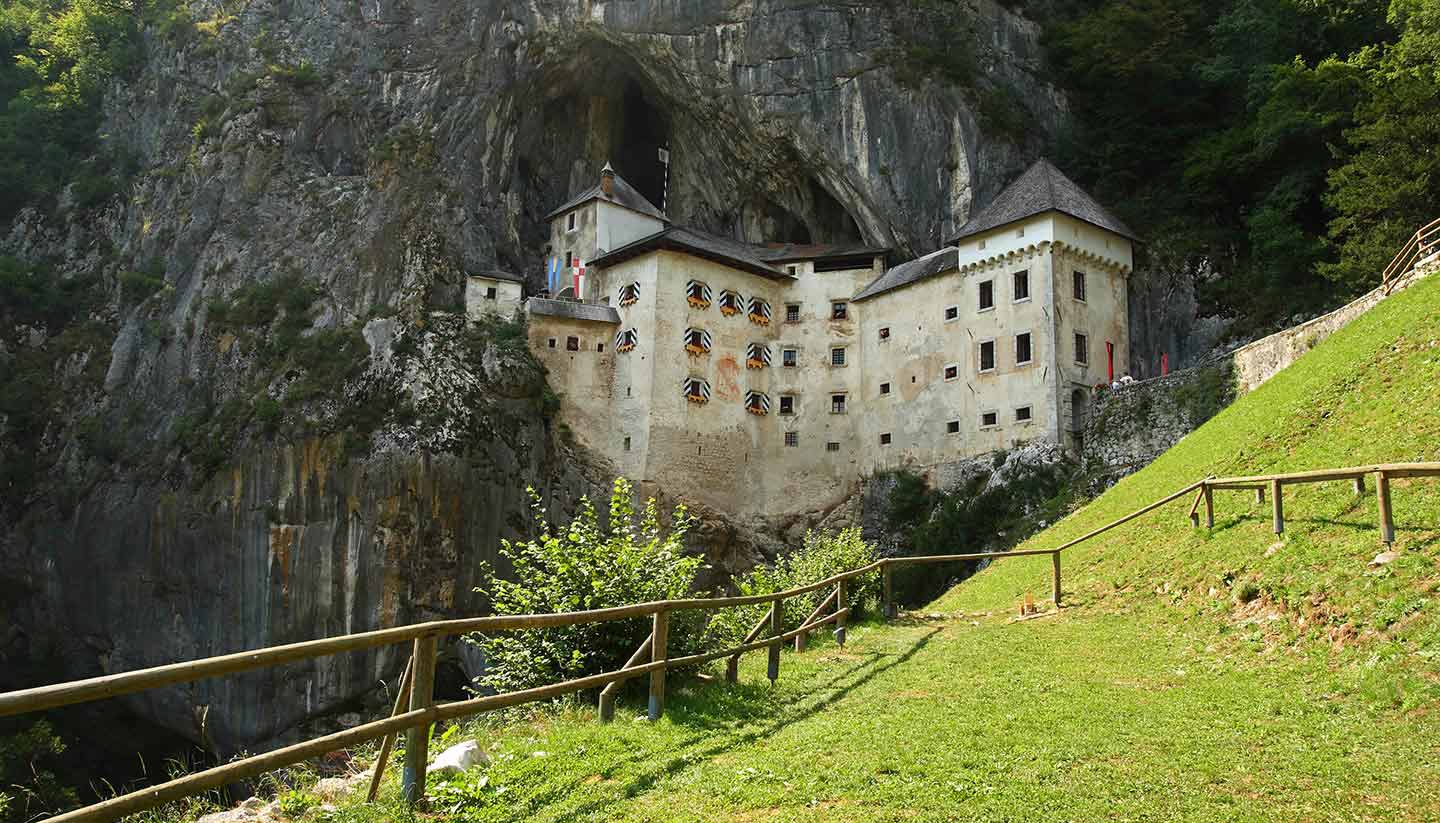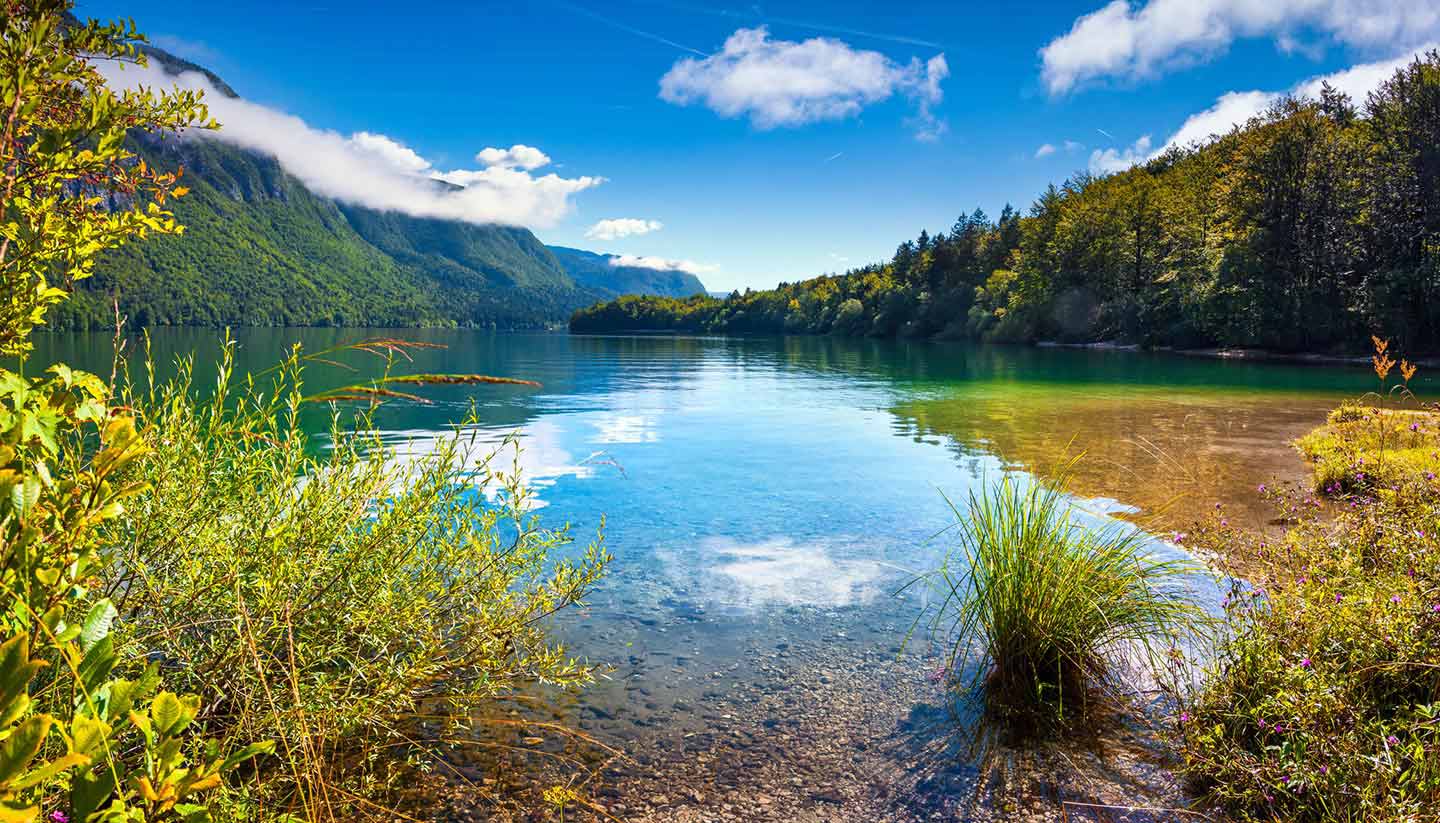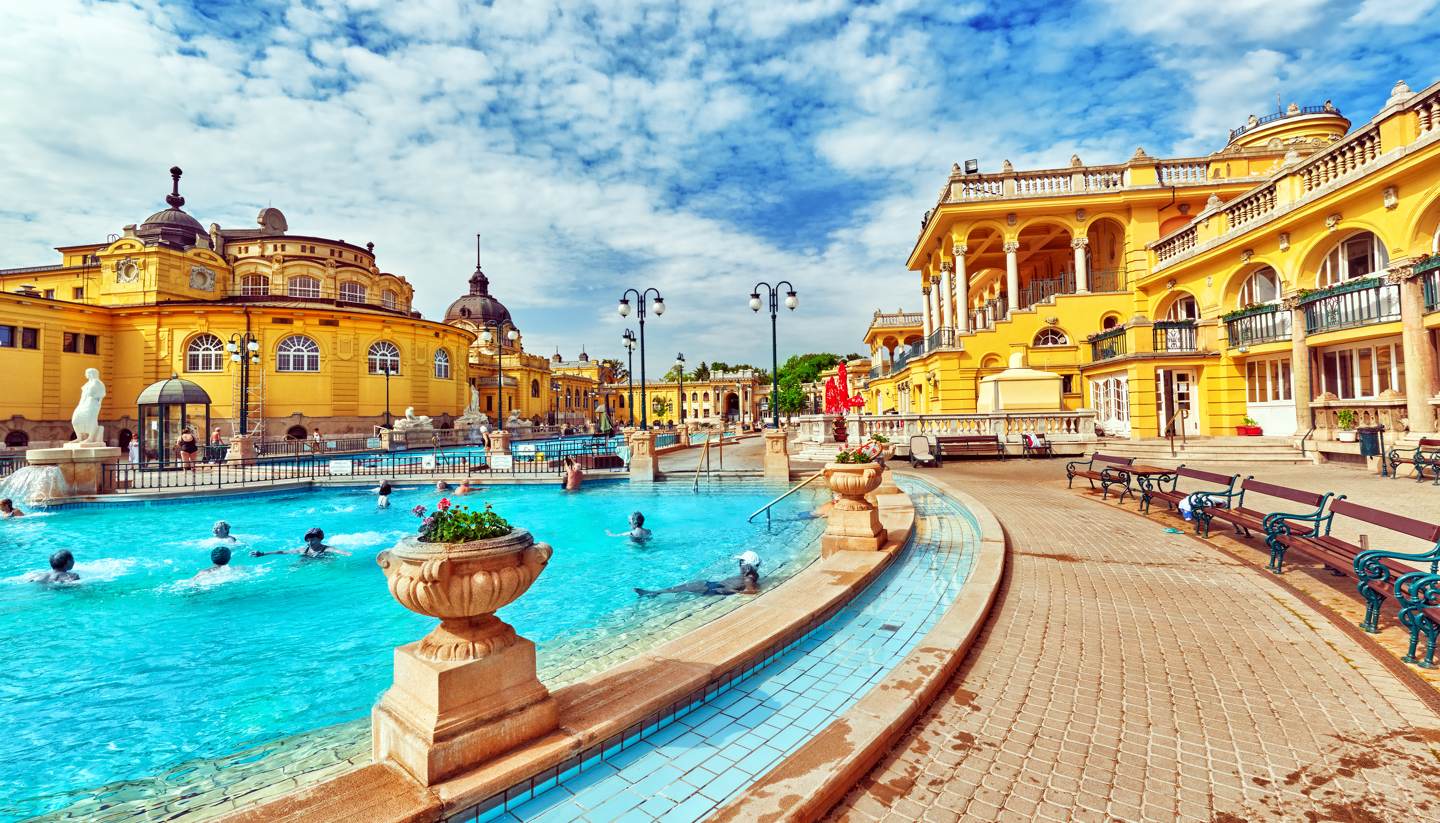Slovenia travel guide
About Slovenia
Though it may lack the pulling power of its heavyweight neighbours, this charming country is rich in rewards for travellers willing to take a punt.
Sandwiched between Italy, Austria, Hungary and Croatia, this tiny nation occupies a picturesque pocket of Europe, which is characterised by verdant valleys, glacial lakes and snow-capped mountains. Slovenia has been greatly influenced by the countries surrounding it; the baroque architecture, ancient castles and sophisticated cuisine are evocative of western neighbours, while the quaint rural villages, Slavic language and low prices have a decidedly eastern feel.
But, Slovenia has its own identity. The first of the former Yugoslavian states to join the EU, the country is a progressive, forward-thinking nation. Its people are easy-going and welcoming to outsiders.
Most travellers begin their Slovenian adventure in the capital, Ljubljana, a charming university city whose resident academics give the place a youthful vibe. Carved in two by the Ljubljana River, the city is peppered with cafés, independent shops and a gamut of excellent restaurants. It has a laidback vibe and a calm ambiance, unlike most capitals on the continent.
But it’s when you step outside the capital that Slovenia showcases her true charms; the beautiful Adriatic coastal towns; the rolling vineyards of Jeruzalem-Ormož; the picture-perfect lake Bled; the caves of Postojna and Skocjan; and the black ski runs of Kranjska Gora.
Slovenia is a particularly attractive proposition to outdoor enthusiasts and adrenaline junkies, who can try anything from cycling, hiking and paragliding to white-water rafting, caving and mountaineering. Less adventurous visitors can occupy themselves basking on beaches, people-watching in cafés or quaffing some of the country’s excellent wines.
Key facts
20,273 sq km (7,827 sq miles).
2,067,372 (2018 est.)
102 per sq km.
Ljubljana.
Parliamentary Constitutional Republic.
President Natasa Pirc Musar since 2022.
Prime Minister Robert Golob since 2022.
Travel Advice
The Foreign, Commonwealth & Development Office (FCDO) provides advice about risks of travel to help British nationals make informed decisions. Find out more about FCDO travel advice.
Risk of landslides, floods and high winds
There is a risk of frequent and heavy seasonal (autumn) rainstorms, accompanied by high winds. These could cause flooding, landslides and road closures throughout Slovenia. Check weather and traffic reports before you travel, and follow the instructions of local authorities.
Before you travel
No travel can be guaranteed safe. Read all the advice in this guide as well as support for British nationals abroad which includes:
- advice on preparing for travel abroad and reducing risks
- information for women, LGBT+ and disabled travellers
Follow and contact FCDO travel on Twitter, Facebook and Instagram. You can also sign up to get email notifications when this advice is updated.
Travel insurance
If you choose to travel, research your destinations and get appropriate travel insurance. Insurance should cover your itinerary, planned activities and expenses in an emergency.
This advice reflects the UK government’s understanding of current rules for people travelling on a full ‘British citizen’ passport from the UK, for the most common types of travel.
The authorities in Slovenia set and enforce entry rules. If you’re not sure how these requirements apply to you, contact Slovenia’s embassy in the UK.
COVID-19 rules
There are no COVID-19 testing or vaccination requirements for travellers entering Slovenia.
Passport validity requirements
To travel to Slovenia, you must follow the Schengen area passport requirements.
To enter Slovenia (and all Schengen countries) your passport must:
- have a ‘date of issue’ less than 10 years before the date you arrive. Passports issued after 1 October 2018 are now valid for only 10 years, but for passports issued before 1 October 2018, extra months may have been added if you renewed a passport early
- have an ‘expiry date’ at least 3 months after the day you plan to leave
Contact Slovenia’s embassy in the UK if your passport does not meet both these requirements.
Check with your travel provider that your passport and other travel documents meet requirements. Renew your passport if you need to.
You will be denied entry if you do not have a valid travel document, or try to use a passport that has been reported lost or stolen.
Checks at border control
Border checks have been introduced at Slovenia’s borders with Italy, Croatia and Hungary and will be in place for 6 months. Austrian border checks will continue. If travelling from Croatia or Hungary you should only attempt to enter Slovenia at the specific border crossings that are open to all passengers. See the list on the Slovene government webpage. You should allow extra time for crossing land borders from and into Slovenia, and be ready to show your passport or residency card if you are asked to do so by the border police. Checks may also involve vehicle inspections.
Make sure you get your passport stamped.
If you’re a visitor, your passport must be stamped when you enter or leave the Schengen area (which includes Slovenia). Border guards will use passport stamps to check you have not overstayed the 90-day visa-free limit for stays in the Schengen area. If your passport was not stamped, border guards will presume you have overstayed the visa-free limit.
If your passport was not stamped, show evidence of when and where you entered or left the Schengen area (for example, boarding passes or tickets) and ask the border guards to add the date and location in your passport.
Read about passport stamping if you live in Slovenia.
At Slovenian border control, you may also need to:
- show a return or onward ticket
- show you have enough money for your stay
Visa requirements
You can travel to the Schengen area (including Slovenia) for up to 90 days in any 180-day period. This applies if you travel:
- as a tourist
- to visit family or friends
- to attend business meetings, cultural or sports events
- for short-term studies or training
If you are travelling to Slovenia and other Schengen countries without a visa, make sure your whole visit is within the 90-day limit. Visits to Schengen countries within the previous 180 days before you travel count towards your 90 days.
Applying for a visa
To stay longer than 90 days - to work or study, for business travel or for other reasons - you will need to meet the Slovenian government’s entry requirements. Check what you need to do to work in Slovenia. If you need a visa, you can apply online using Slovenian visa application forms.
Registration with the police
You must register with the police within 3 days of your arrival, but any registered hotel or guest house will do this for you. If you are staying in self-catering accommodation, or with friends or family, check registration arrangements with your booking agent or your host. If you do not register your presence in Slovenia, you could get a fine.
Vaccination requirements
At least 8 weeks before your trip, check the vaccinations and certificates you need in TravelHealthPro’s Slovenia guide.
Customs rules
There are strict rules about goods that can be brought into and taken out of Slovenia. For more information see Slovenia’s customs webpage on import of goods. You must declare anything that may be prohibited or subject to tax or duty.
Taking food and drink into Slovenia
You cannot take meat, milk or products containing them into EU countries. There are some exceptions for medical reasons, for example certain amounts of powdered infant milk, infant food, or pet food. Check the rules about taking food and drink into the EU on the European Commission website.
If you’re travelling through Slovenia
Border control may ask you for proof that you have the means to leave Slovenia and enter a neighbouring country.
You can find further details on the Slovenian Police website.
Terrorism
There is a high threat of terrorist attack globally affecting UK interests and British nationals, including from groups and individuals who view the UK and British nationals as targets. You should remain vigilant at all times.
UK Counter Terrorism Policing has information and advice on staying safe abroad and what to do in the event of a terrorist attack. Find out how to reduce your risk from terrorism while abroad.
Terrorism in Slovenia
Although there’s no recent history of terrorism in Slovenia, attacks cannot be ruled out.
Laws and cultural differences
Personal ID
Carry a copy of your passport at all times as a form of identification.
Public offences
There are heavy on-the-spot fines for jaywalking. You should only cross the road at designated crossing points. If you cannot pay an on-the-spot fine the police or authorities can confiscate documents or assets until the fine is paid.
LGBT+ travellers
Read advice for LGBT+ travellers.
Tour guides
All tour guides are required to display a tour guide card to show they have met the conditions to operate as a guide in Slovenia.
Outdoor activities and adventure tourism
Skiing and mountaineering
If you are planning a skiing or mountaineering holiday, check online for advice on weather, safety conditions and risks before travelling. Off-piste skiing is highly dangerous as there is a risk of avalanches in some areas.
Hiking
If you plan to hike in Slovenia, consider the level of difficulty and distance, and plan for the weakest member of your group. Some demanding mountain trails can include sections of Via Ferrata (steel wires and metal rungs) which need a climbing harness and helmet. Use a printed or digital map with marked paths and their descriptions. Inform family and friends of your plans. Check whether mountain cabins are open. Do not use hiking trails that have been closed or take shortcuts. If you need mountain rescue assistance, call 112.
Transport risks
Road travel
You can drive in Slovenia on your UK driving licence for up to 90 days. For any longer, you need a 1968 international driving permit (IDP). You cannot buy an IDP outside the UK, so get one before you travel. You can buy an IDP in person from some UK post offices – find your nearest post office branch that offers this service.
If you live in Slovenia, check the driving requirements for residents.
If you are planning to drive in Slovenia, see information on driving in the EU and read the rules of the road in RAC’s Slovenia guide.
By law, you must have your headlights on at all times when driving in Slovenia. You also need to carry a reflective jacket, a warning triangle and a first aid kit in the vehicle.
The police can impose on-the-spot fines for offences including speeding, driving under the influence of alcohol and for using mobile phones without wireless headsets.
If you plan to drive your own car, you need a UK sticker. Since 2021, UK stickers have replaced GB stickers. Check which UK sticker to display.
For the latest traffic conditions, go to the PIC Traffic Information Centre website. Travel updates and information on border crossings and international rail journeys can be found at the Slovenian Traffic Information Centre.
Tolls
If you drive on Slovenian motorways, you must buy an ‘e-vignette’. E-vignettes are available weekly, monthly or yearly. You can buy them at petrol stations, post offices and DARs (the Slovenian Motorway Company) offices in Slovenia as well as outlets in neighbouring countries near the Slovenian border. You can also buy e-vignettes online at the DARs website including in advance of arrival in Slovenia. If you are getting an e-vignette online, use the official DARs website.
Drivers of vehicles over 3.5 tonnes can use Slovenia’s electronic tolling system on motorways and expressways. You’ll need to register your vehicle under the DarsGo system and collect the DarsGo unit from a DarsGo service point when you enter Slovenia for the first time.
Driving in winter
Winter equipment is mandatory from 15 November until 15 March and whenever there are winter weather conditions (eg at times of snowfall, blizzards or black ice).
Private cars and vehicles up to 3.5 tonnes must be equipped with winter tyres on all 4 wheels, or summer tyres on all 4 wheels plus snow chains in the car boot. The minimum tyre tread depth is 3mm. Vehicles over 3.5 tonnes must have winter tyres on the driving wheels or summer tyres on all 4 wheels plus snow chains in the boot.
You can be fined 125 euros for not having this equipment, or 417 euros if you also cause a delay on the road.
Extreme weather and natural disasters
You can monitor current weather forecast and warnings at MeteoAlarm (in English).
Storms
All parts of Slovenia can experience extreme storms, including strong winds and rain, lightning, and powerful and large hailstorms. Such storms can occur suddenly. Seek shelter and follow local advice until the storm passes.
Forest fires
During especially hot and dry periods there is a danger of forest fires. It’s illegal to do anything that starts a fire that poses a danger to human life or could cause significant material damage.
Flooding
Flash floods can occur with very little warning and can lead to dangerous water flows and disruption to transport and other networks. Keep a close eye on weather forecasts and follow the advice of local authorities.
Earthquakes
Western Slovenia is on an earthquake fault line and is subject to occasional tremors.
Before you travel check that:
- your destination can provide the healthcare you may need
- you have appropriate travel insurance for local treatment or unexpected medical evacuation
This is particularly important if you have a health condition or are pregnant.
Emergency medical number
Dial 112 and ask for an ambulance.
Contact your insurance or medical assistance company promptly if you’re referred to a medical facility for treatment.
For more information read guidance on healthcare when travelling in Europe.
Vaccinations and health risks
At least 8 weeks before your trip check:
- the latest information on vaccinations and health risks in TravelHealthPro’s Slovenia guide
- where to get vaccines and whether you have to pay on the NHS travel vaccinations page
Altitude sickness is a risk in parts of Slovenia. Read more about altitude sickness on TravelHealthPro.
Tick bites, and tick-borne encephalitis, are a risk throughout Slovenia. Read more about avoiding tick and insect bites on TravelHealthPro.
Medication
The legal status and regulation of some medicines prescribed or bought in the UK can be different in other countries.
Read best practice when travelling with medicines on TravelHealthPro.
The NHS has information on whether you can take your medicine abroad.
Healthcare facilities in Slovenia
FCDO has a list of English-speaking doctors in Slovenia.
COVID-19 healthcare in Slovenia
Slovenia’s government offers English-language COVID-19 guidance and updates.
Health insurance cards
Apply for a free UK Global Health Insurance Card (GHIC) or European Health Insurance Card (EHIC) before leaving the UK. If you already have an EHIC, it will still be valid as long as it remains in date.
The GHIC or EHIC entitles you to state-provided medical treatment necessary during your trip. Any treatment provided is on the same terms as Slovenian nationals. If you do not have your card with you or you’ve lost it, contact the NHS Overseas Healthcare Team.
It’s important to take out appropriate travel insurance for your needs. A GHIC or EHIC is not an alternative to travel insurance and you should have both before you travel. A GHIC or EHIC does not cover all health-related costs, for example, medical repatriation, ongoing medical treatment and non-urgent treatment. Read more about what your travel insurance should cover.
GHIC and EHIC cover state healthcare only, not private treatment. You will be responsible for the cost of any treatment provided by a private doctor or private clinic.
Travel and mental health
Read FCDO guidance on travel and mental health. There is also mental health guidance on TravelHealthPro.
Getting help
The Foreign, Commonwealth & Development Office (FCDO) cannot provide tailored advice for individual trips. Read this travel advice and carry out your own research before deciding whether to travel.
Emergency services in Slovenia
Telephone: 112 (ambulance, fire, police).
Contact your travel provider and insurer
Contact your travel provider and your insurer if you are involved in a serious incident or emergency abroad. They will tell you if they can help and what you need to do.
Refunds and changes to travel
For refunds or changes to travel, contact your travel provider. You may also be able to make a claim through insurance. However, insurers usually require you to talk to your travel provider first.
Find out more about changing or cancelling travel plans, including:
- where to get advice if you are in a dispute with a provider
- how to access previous versions of travel advice to support a claim
Support from FCDO
FCDO has guidance on staying safe and what to do if you need help or support abroad, including:
- finding English-speaking lawyers, funeral directors and translators and interpreters in Slovenia
- dealing with a death in Slovenia
- being arrested or imprisoned in Slovenia
- getting help if you’re a victim of crime
- what to do if you’re in hospital
- if you’re affected by a crisis, such as a terrorist attack
Contacting FCDO
Follow and contact FCDO travel on Twitter, Facebook and Instagram. You can also sign up to get email notifications.
Help in Slovenia in an emergency
If you are abroad and you need emergency help from the UK government, contact the British Embassy in Ljubljana.
You can also contact FCDO online.
FCDO in London
You can call FCDO in London if you need urgent help because something has happened to a friend or relative abroad.
Telephone: 020 7008 5000 (24 hours)
Risk information for British companies
The Overseas Business Risk service offers information and advice for British companies operating overseas on how to manage political, economic, and business security-related risks.





